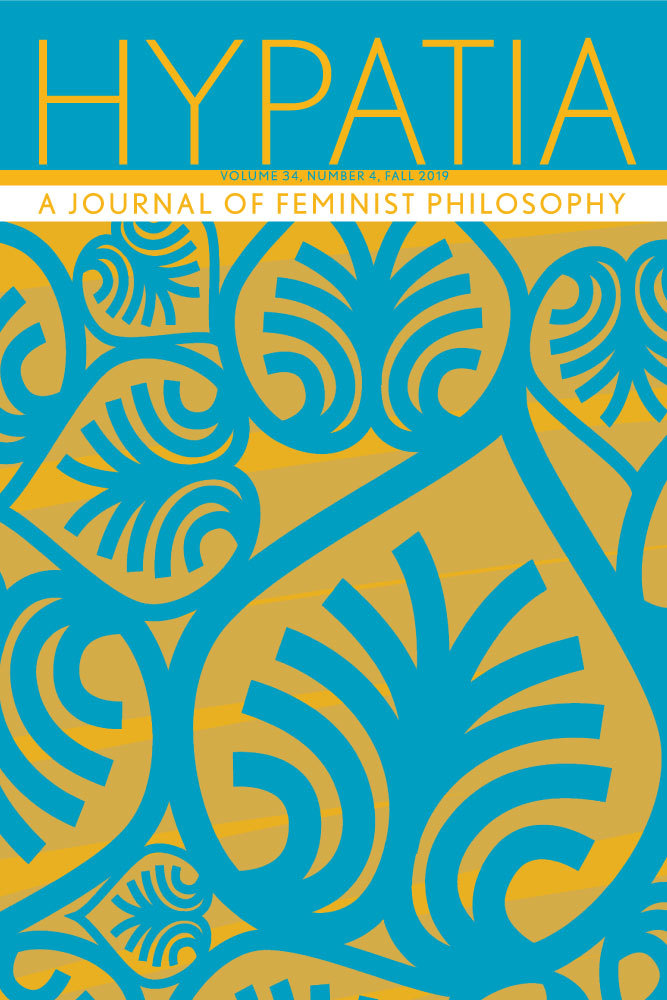Guidelines for Contributors/Calls for Papers
For our most current guidelines, please see our website, http://www.csupotnona.edu/~hypatia.
Hypatia solicits papers on all topics in feminist philosophy. Please send five copies and an electronic copy of your paper on disk to:
Editors, Hypatia
Department of Philosophy
Pennsylvania State University
240 Sparks Building
University Park, PA 16802-5201
Email: [email protected]
Voice: (814) 865-1918
Fax: (814) 865-0119
TTY Direct (TTY to TTY): (814) 865-7357
TTY Relay (Voice to TTY): 1 800 654-5988
If you are an IBM user, please submit your electronic version on IBM-compatible disk, with your files saved in Microsoft Word format. If you are a Macintosh user, please submit your paper, saved in Microsoft Word format, via email attachment. Be sure to submit both an electronic copy and hard copy.
Articles may vary in length, though long articles will be published only as space permits. In addition to substantial research papers, we invite submissions for our Comment/Reply, Archive, and Review Essay sections, as well as proposals for our Symposia and Special Features sections. We also invite proposals for Special Issues. Book reviews are normally by invitation.
Manuscripts submitted to Hypatia should not be under simultaneous consideration by any other journal, nor should they have been published elsewhere. The review process takes an average of six months. Though the primary aim of our review process is to select and refine papers for publication, we aim to have the review process nurture and support scholarship in the area of feminist philosophy.
Manuscript Preparation:
- 1
Manuscripts should be typed, double-spaced with 1.25 inch margins (including quotations and excerpts, notes, and references) and the right margin should not be justified.
- 2
The author should not be identified except on the title page in order to facilitate our anonymous review process.
- 3
Papers should include a 75-word (or less) abstract.
- 4
Use 8 × 11-inch white paper. Dot-matrix print is acceptable only if the characters are clear and legible. Send five clean copies of the manuscript.
- 5
Use American spellings and punctuation, except when directly quoting a source that has followed British style. All punctuation, except colons and semicolons, should be placed inside quotation marks. Single quotation marks are used only for quotes within quotes. Quoted material of 10 lines or more in length should be set off from the text without quotation marks as double-indented extracts.
- 6
Notes should appear in a separate section at the end of the paper and should be kept brief. Any acknowledgments should appear first, unnumbered.
- 7
We use the Author/Date system of citing references, as described in The Chicago Manual of Style (14th ed., University of Chicago Press, 1993). In the text or notes, works should be cited as follows (author year, page number); for example (Anzaldúa 1990, 86). An author's name can be left out if understood from the context; for example (1990, 86). A list of all works cited should be included after the notes in a list called “References.” For example:
Benhabib, Seyla. 1992. Situating the self: Gender, community, and postmodernism in contemporary ethics. New York: Routledge. [book]
Collins, Patricia Hill. 2000. It's all in the family: Intersections of race, gender, and nation. In Decentering the center: Philosophy for a multicultural, postcolonial, and feminist world, ed. Uma Narayan and Sandra Harding. Bloomington: Indiana University Press. [article or chapter in a book—fully cite even when that book already appears in same reference list]
Le Doeuff, Michèle. 1989. The philosophical imaginary. Trans. Colin Gordon. London: Athlone Press, [translated book]
Lugones, Maria. 1990a. Hablando cara a cara/Speaking face to face. In Making face, making soul/Haciendo cams: Creative and critical perspectives by women of color, ed. Gloria Anzaldúa. San Francisco: Aunt Lute Books. [first of two publications of same author in same year]
—. 1990b. Structure/antistructure and agency under oppression. The Journal Of Philosophy 87 (10): 500-507. [journal article; second of two publications of same author in same year]
Narayan, Uma, and Sandra Harding, eds. 2000. Decentering the center: Philosophy for a multicultural, postcolonial, and feminist world. Bloomington: Indiana University Press. [work with multiple authors or editors]
Spivak, Gayatri Chakravorty. 1996. “Woman” as theatre: Beijing 1995. Radical Philosophy 75 (January): 2-4. [journal article without issue number]
- 8
Final versions of papers accepted for publication must be submitted both in hard copy and on a 3.5 computer disk. If a paper includes figures or artwork, authors must submit camera-ready copy with the final draft. Short sound or video files, and selected images may be simultaneously published with an article on our website.
Papers that do not follow format instructions #1-7 may be returned to their authors before being sent for review. Authors in the United States or Canada should send five copies to the address above. Authors outside of the United States or Canada, and unaffiliated scholars, may send one copy.




